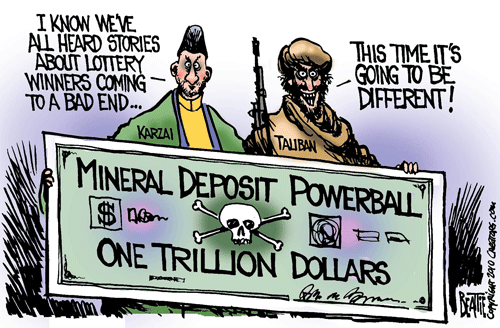Introduction to the Resource Curse

Image credit: “The Lighter Side: Government Reform”
By: Jonathan Burns and Ryan Patel.
Edited by: Adrian Nardella.
Surprisingly, the growth of resource-rich countries often is more stagnant than of countries without an abundance of resources. This situation is referred to by economists as the “resource curse” or “paradox of plenty”. Essentially, it is a situation in which countries with a significant amount of resources experience stunted growth and sometimes even contraction. This ironic situation transpires when the resource-rich country begins to focus all of its energies on a particular industry. In overspecializing on one industry, a country often chooses not to devote as much of an interest into other sectors of its economy. In addition, the lack of economic growth is exacerbated by the volatility and swing of commodity markets. Furthermore, without a sound political structure, the dispersion of wealth fails to reach the areas of the economy that benefit long-term growth.
In the article, “Resource Rich, Cash Poor”, Joseph Stiglitz highlights this problem in reference to the new discoveries of natural resources in Ghana, Uganda, Tanzania, and Mozambique. Stiglitz offers potential solutions that these countries would need to avoid this “resource curse”. Among the solutions he argues for are: ensuring transparency between the government and the citizens, renegotiating contracts that give a disproportionate share of the resources’ value to foreign companies, and using revenues from the resources to reinvest in weak sectors of the economy. Specifically, a government ought to focus in on the idea of reinvesting in one’s own economy. While a particular “resource-rich” country is fortunate to have a comparative advantage in a specific resource, Stiglitz argued that this is not enough. What these countries need is a dynamic advantage, or as Stiglitz referred to it, “a comparative advantage in the long run”. South Korea and its comparative advantage of rice can be used as a compelling example. Indeed, had South Korea only stuck to their agricultural strengths, they would probably not have the strong infrastructure and technology seen today.
Although, Stiglitz accurately identified a couple solutions for resource-rich counties, one ought to realize it is easier said than done. How exactly can we convince a poor country, such as Ghana, who has recently discovered natural resources, not to fully invest everything into that resource and then reinvest the revenues to further maximize profits? Even if there is great transparency, and even if the citizens have a say, what is to say that they too wouldn’t want to reap all revenues from that fortunate resource. Intuitively this seems like it could be a problem as it is basic self-interest to always want more and fully maximize an opportunity. With this said, one potential practical solution was identified in the New York Times article, “Poor Countries, Rich Resources”. The article highlighted the actions taken by the World Bank in Chad. According to the CIA World Factbook, the agricultural industry employs roughly 80% of Chad’s labor force, contributing over 50% to the country’s GDP. In order to disperse wealth to other areas of the economy, the World Bank developed a plan (that Chad’s dictator agreed to) in which revenues are to be directly spent on health, education, and infrastructure programs. The plan is to be overseen by the World Bank and a committee of citizens; not those who hold power in the agricultural sector.
Perhaps an additional solution could be applied to the concept of “charter cities” recently discussed in class. With a charter city and the potential for future growth to spread from the city to the host country, foreign investors may be inclined to invest in the surrounding areas outside the county. Further, and perhaps most importantly, the host country would be more likely to reinvest some of its own revenues from the natural resources to other areas of the country to make the country more appealing to other industries and capitalize on the potential spillover effect from the charter city. In all, resource-rich countries need to consider potential solutions and how to practically apply them in order to savor and capitalize and their fortunate resource advantages.
Discussion (4) | September 23rd, 2012 Categories: Institutions

